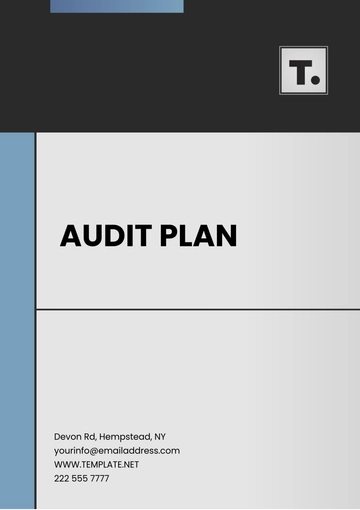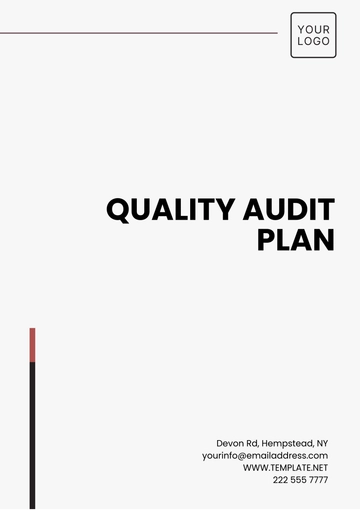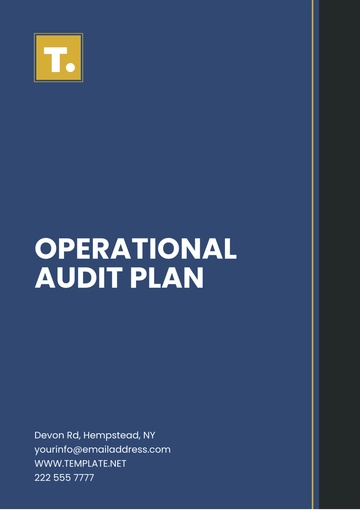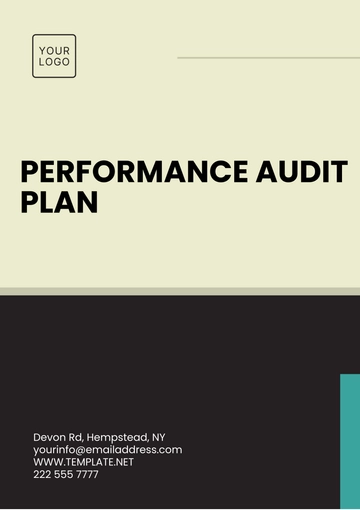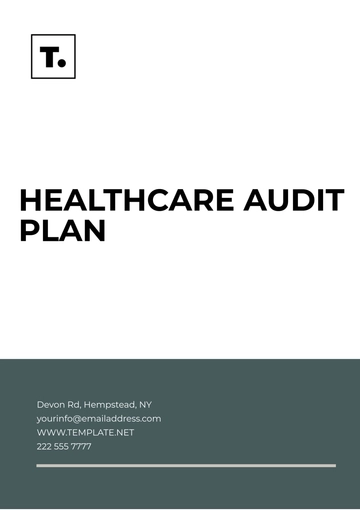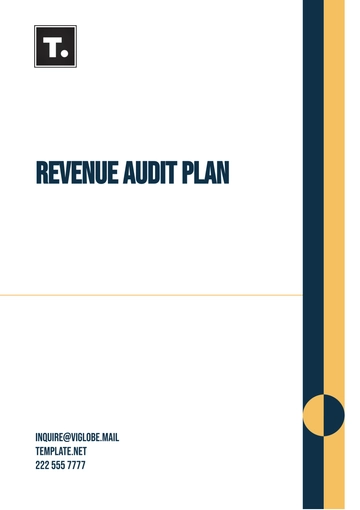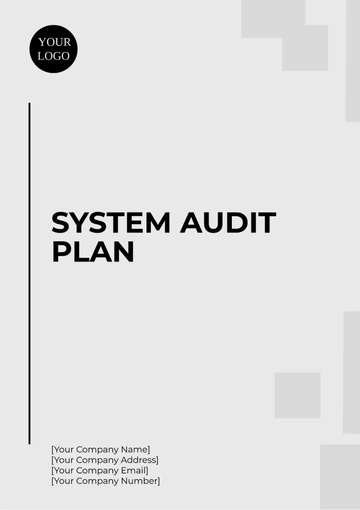Free Healthcare Audit Plan
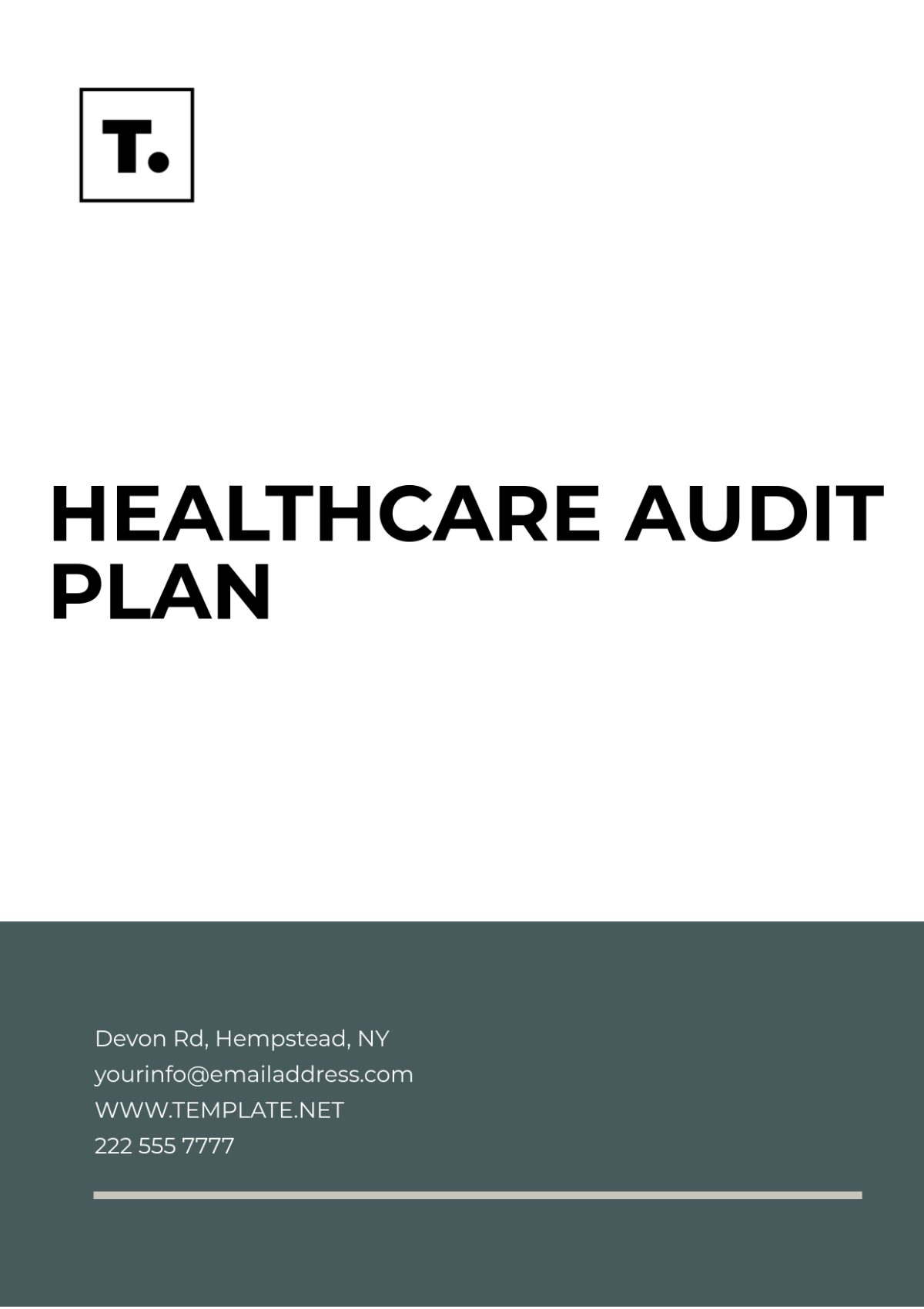
I. Introduction
The Healthcare Audit Plan serves as a comprehensive framework designed to enhance the effectiveness and efficiency of healthcare services, ensure compliance with relevant laws and regulations, and protect the organization's assets. This document outlines a structured methodology for preparing and executing audits within healthcare organizations, promoting accountability and continuous improvement.
II. Objectives of the Audit
The primary objectives of a healthcare audit are to:
Assess Compliance: Ensure adherence to healthcare laws, regulations, and industry standards.
Evaluate Effectiveness: Analyze the quality and efficacy of healthcare services delivered to patients.
Identify Improvement Opportunities: Recognize areas where performance can be enhanced, fostering a culture of excellence.
Optimize Resource Utilization: Verify that resources are used efficiently to maximize patient outcomes and organizational sustainability.
III. Scope of the Audit
The audit will encompass various critical components of the healthcare organization:
A. Financial Audits
Thorough examination of financial statements, including revenue, expenditures, and balance sheets.
Assessment of internal controls to prevent fraud and ensure accurate reporting.
Review compliance with financial policies, accounting standards, and regulatory requirements.
B. Compliance Audits
Evaluation of adherence to healthcare regulations, including HIPAA and other relevant laws.
Examination of patient privacy protocols and data protection measures to safeguard sensitive information.
Assessment of billing practices and coding accuracy to prevent compliance violations.
C. Operational Audits
Analysis of the efficiency and effectiveness of service delivery processes, including patient flow and care coordination.
Review of resource allocation strategies to ensure optimal utilization of staff, equipment, and facilities.
Identification of bottlenecks or redundancies that may hinder operational efficiency.
IV. Audit Methodology
The audit will follow a systematic methodology consisting of three key phases:
A. Planning
Develop a detailed audit plan that outlines objectives, scope, and methodology.
Identify key areas of focus and establish a clear timeline for each phase of the audit process.
B. Execution
Conduct fieldwork, which includes on-site evaluations, interviews with staff, and collection of relevant data.
Gather evidence through document reviews and direct observations to substantiate findings.
C. Reporting
Prepare a comprehensive audit report summarizing findings, highlighting significant issues, and providing actionable recommendations for improvement.
Present the report to relevant stakeholders and facilitate discussions to ensure understanding and commitment to implementing changes.
V. Audit Team
The audit team will consist of experienced professionals with diverse expertise, ensuring a holistic approach to the audit process. Team members will include:
Lead Auditor: Responsible for overall audit oversight and coordination.
Financial Analyst: Focused on financial assessments and compliance with accounting practices.
Compliance Specialist: Ensures adherence to healthcare regulations and evaluates risk management processes.
Healthcare Operations Expert: Analyzes service delivery and operational efficiency.
VI. Audit Schedule
The audit schedule outlines major activities and associated timelines to ensure efficient execution:
Phase | Activity | Timeline |
|---|---|---|
Planning | Initial meetings and development of audit plan | 1-2 weeks |
Execution | On-site evaluations, data collection, and analysis | 3-4 weeks |
Reporting | Drafting, reviewing, and disseminating the audit report | 1-2 weeks |
VII. Conclusion
The effective implementation of the Healthcare Audit Plan is crucial for identifying areas for improvement, ensuring regulatory compliance, enhancing the quality of care, and optimizing resource utilization. By fostering a culture of accountability and continuous improvement, the healthcare organization can better serve its patients and stakeholders, ultimately leading to improved health outcomes and operational sustainability.
- 100% Customizable, free editor
- Access 1 Million+ Templates, photo’s & graphics
- Download or share as a template
- Click and replace photos, graphics, text, backgrounds
- Resize, crop, AI write & more
- Access advanced editor
Conduct detailed healthcare audits with Template.net’s Healthcare Audit Plan Template. This customizable and editable template is designed for auditing healthcare processes, ensuring compliance and efficiency. Editable in our Ai Editor Tool, it offers a professional framework for managing healthcare audits effectively. Tailor it to meet your audit needs.
You may also like
- Finance Plan
- Construction Plan
- Sales Plan
- Development Plan
- Career Plan
- Budget Plan
- HR Plan
- Education Plan
- Transition Plan
- Work Plan
- Training Plan
- Communication Plan
- Operation Plan
- Health And Safety Plan
- Strategy Plan
- Professional Development Plan
- Advertising Plan
- Risk Management Plan
- Restaurant Plan
- School Plan
- Nursing Home Patient Care Plan
- Nursing Care Plan
- Plan Event
- Startup Plan
- Social Media Plan
- Staffing Plan
- Annual Plan
- Content Plan
- Payment Plan
- Implementation Plan
- Hotel Plan
- Workout Plan
- Accounting Plan
- Campaign Plan
- Essay Plan
- 30 60 90 Day Plan
- Research Plan
- Recruitment Plan
- 90 Day Plan
- Quarterly Plan
- Emergency Plan
- 5 Year Plan
- Gym Plan
- Personal Plan
- IT and Software Plan
- Treatment Plan
- Real Estate Plan
- Law Firm Plan
- Healthcare Plan
- Improvement Plan
- Media Plan
- 5 Year Business Plan
- Learning Plan
- Marketing Campaign Plan
- Travel Agency Plan
- Cleaning Services Plan
- Interior Design Plan
- Performance Plan
- PR Plan
- Birth Plan
- Life Plan
- SEO Plan
- Disaster Recovery Plan
- Continuity Plan
- Launch Plan
- Legal Plan
- Behavior Plan
- Performance Improvement Plan
- Salon Plan
- Security Plan
- Security Management Plan
- Employee Development Plan
- Quality Plan
- Service Improvement Plan
- Growth Plan
- Incident Response Plan
- Basketball Plan
- Emergency Action Plan
- Product Launch Plan
- Spa Plan
- Employee Training Plan
- Data Analysis Plan
- Employee Action Plan
- Territory Plan
- Audit Plan
- Classroom Plan
- Activity Plan
- Parenting Plan
- Care Plan
- Project Execution Plan
- Exercise Plan
- Internship Plan
- Software Development Plan
- Continuous Improvement Plan
- Leave Plan
- 90 Day Sales Plan
- Advertising Agency Plan
- Employee Transition Plan
- Smart Action Plan
- Workplace Safety Plan
- Behavior Change Plan
- Contingency Plan
- Continuity of Operations Plan
- Health Plan
- Quality Control Plan
- Self Plan
- Sports Development Plan
- Change Management Plan
- Ecommerce Plan
- Personal Financial Plan
- Process Improvement Plan
- 30-60-90 Day Sales Plan
- Crisis Management Plan
- Engagement Plan
- Execution Plan
- Pandemic Plan
- Quality Assurance Plan
- Service Continuity Plan
- Agile Project Plan
- Fundraising Plan
- Job Transition Plan
- Asset Maintenance Plan
- Maintenance Plan
- Software Test Plan
- Staff Training and Development Plan
- 3 Year Plan
- Brand Activation Plan
- Release Plan
- Resource Plan
- Risk Mitigation Plan
- Teacher Plan
- 30 60 90 Day Plan for New Manager
- Food Safety Plan
- Food Truck Plan
- Hiring Plan
- Quality Management Plan
- Wellness Plan
- Behavior Intervention Plan
- Bonus Plan
- Investment Plan
- Maternity Leave Plan
- Pandemic Response Plan
- Succession Planning
- Coaching Plan
- Configuration Management Plan
- Remote Work Plan
- Self Care Plan
- Teaching Plan
- 100-Day Plan
- HACCP Plan
- Student Plan
- Sustainability Plan
- 30 60 90 Day Plan for Interview
- Access Plan
- Site Specific Safety Plan
